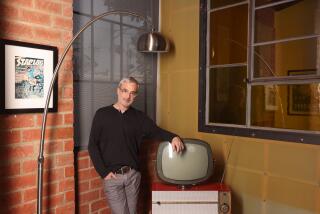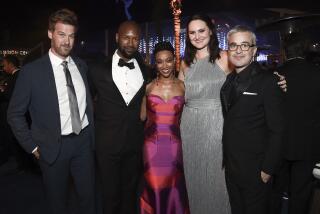From the Bard on the Boards to the Bridge of TV’s ‘Star Trek’
- Share via
LOS ANGELES — British classical actor Patrick Stewart credits Shakespeare with putting him on the bridge of the Starship Enterprise.
A year ago, Stewart, who stars as Capt. Jean-Luc Picard on “Star Trek: The Next Generation,” was more familiar with Richard III and Paduans than Mr. Spock and Klingons. “Beam me up, Scotty,” was virtually a mystery.
“The role has made me part of the ‘Star Trek’ legend, and it’s because of the actor’s adage that you never know who’s out there,” he says.
A friend asked Stewart to read some dramatic extracts at a literary lecture at UCLA. In the audience was Robert Justman, who had been a producer of the original “Star Trek” TV series and was casting Paramount Television’s new syndicated series.
“Allegedly, he turned to his wife and said, ‘We have just found our captain’,” Stewart says.
“Well, it took six months before I got the role. I went back to London and was hoping to take a revival of ‘Who’s Afraid of Virginia Woolf?’ into the West End. If I had, I wouldn’t be here today. I returned to Los Angeles to read and got an offer.
“It surprised me more than any other offer I’ve had. I thought it unusual for an English actor to be involved in an American TV series. Certainly one with a large cult-like following like ‘Star Trek.’ ”
Stewart was vaguely familiar with “Star Trek.” He sometimes watched it with his children between matinee and evening performances at the Royal Shakespeare Co.
The new “Star Trek” series, begun in September, blasted into orbit in the ratings. It is the third-highest-rated syndicated show, behind “Wheel of Fortune” and “Jeopardy.” The original series, which ran three years on NBC in the 1960s, is frequently the highest-rated off-network syndicated show. The four “Star Trek” movies have taken in nearly $350 million. Nearly 4 million videocassettes of the series episodes and the movies have been sold.
Stewart says it took some time for him to realize that by being cast in the show he had become “an American icon.”
“I was unaware of the huge, huge audience waiting for this show,” he says, “so, I didn’t share the apprehension some had.”
On a recent visit to a TV festival in Cannes, he learned the show’s power. “I was entirely unknown in the city,” he says. “But one night I went with many others to visit the American aircraft carrier Eisenhower. I was immediately recognized by a young officer. I was soon surrounded by crewmen. They had all seen the show in Virginia and their families sent them tapes. It was an overwhelming experience.”
Before “Star Trek,” Stewart was relatively unknown in this country. He was in the movies “Excalibur” and “Dune” and the TV miniseries “I, Claudius.” He played Karla, the head of the KGB in the miniseries based on two John LeCarre novels, “Smiley’s People” and “Tinker, Tailor, Spy.”
Most of his acting experience, however, has been on the stage. He is particularly associated with the Royal Shakespeare Co. He also teaches at UC Santa Barbara.
“I was worried about this role because of the number of years involved,” he says. “I’ve always moved around from role to role and area to area. The fear was I wouldn’t be able to do that. I’m not sure I can focus my career on one thing for such a long time.”
Stewart’s wife, Sheila Falconer, is a choreographer who staged “The Wizard of Oz” in London. A son is a student at the California Institute for the Arts. A daughter is in school in England.
He grew up in Yorkshire, in a town called Mirfield, which supports 12 drama clubs with a population of 11,000.
“It was a typical mill town with weaving sheds in the bottom and sheep on the hills,” he says. “When I was 12 I started spending my evenings rehearsing and performing. Nobody thought it unusual. It didn’t become unusual until I turned professional.”
After he was cast as the captain of the new Enterprise, a lot of discussion went into how he should sound. He experimented with various accents, finally settling on a standard English accent.
“We continue to have disagreements about how certain words are pronounced,” he says.
“I’m the director of a teaching group at Santa Barbara, and I frequently hear student actors say they should use a British accent for Shakespeare. I point out that in Shakespeare’s time the accent was close to today’s American accent.”
More to Read
The complete guide to home viewing
Get Screen Gab for everything about the TV shows and streaming movies everyone’s talking about.
You may occasionally receive promotional content from the Los Angeles Times.






